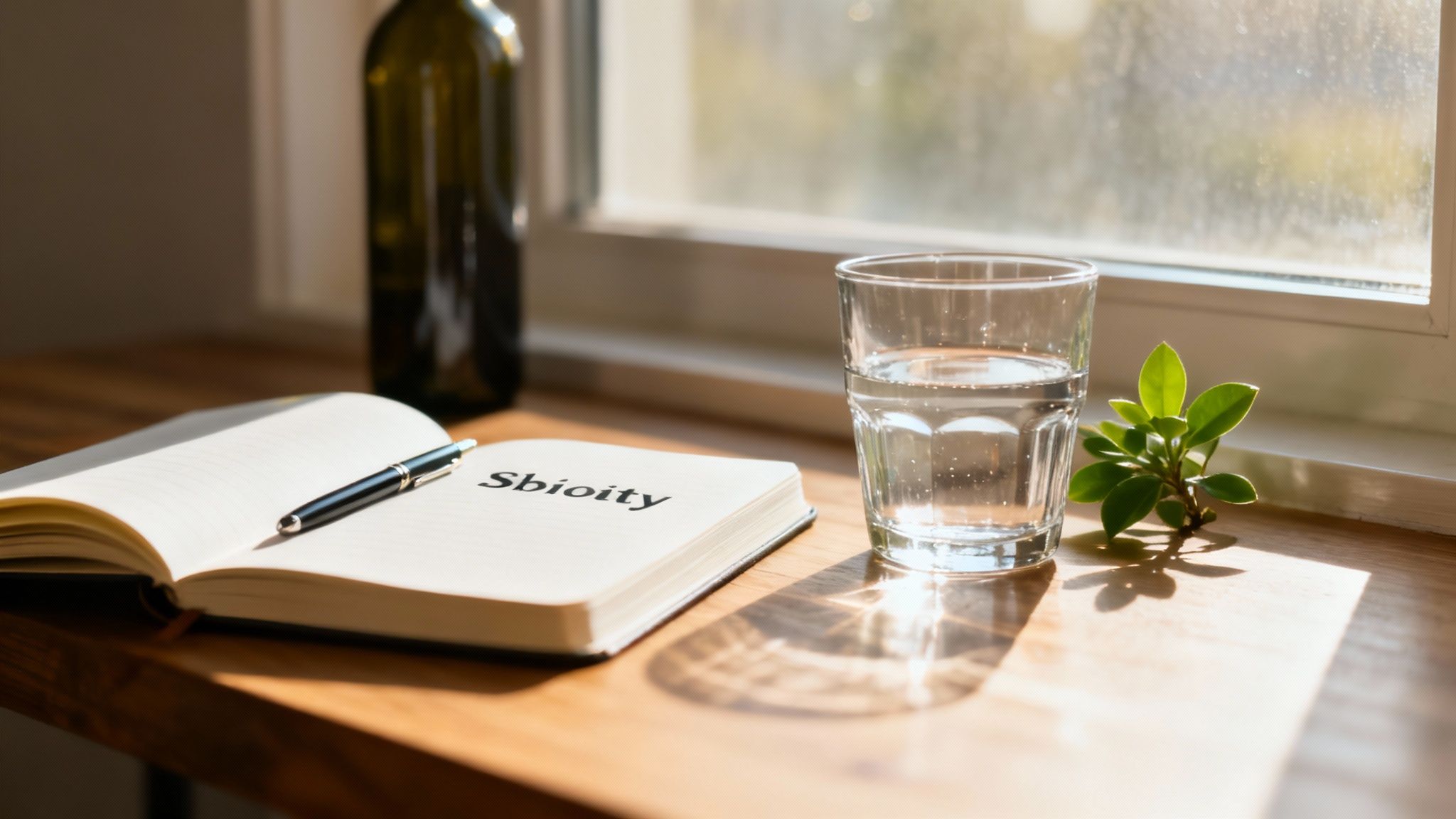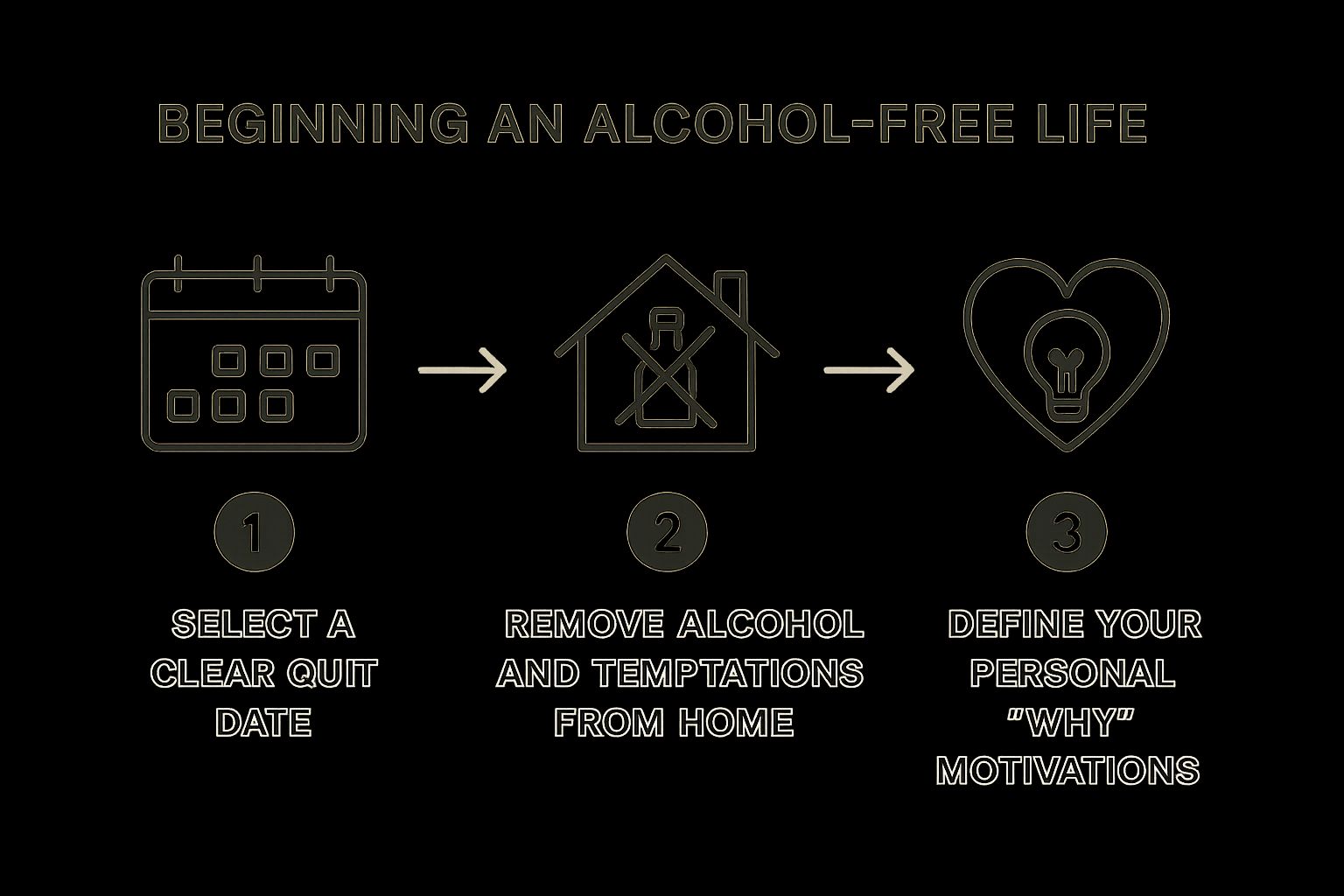
How Can You Quit Drinking Alcohol a Practical Guide
So, you’ve decided to quit drinking. That’s a huge, life-changing decision, and honestly, it’s the most important first step. The key now is turning that powerful decision into concrete, real-world actions. It’s not about mapping out the next five years; it’s about what you can do right now to get through the first few days and weeks successfully.
Think of it as building a strong foundation. Instead of getting overwhelmed by the big picture, we’re going to focus on a few immediate, manageable tasks. Each one you complete makes the next one easier, creating a supportive environment that makes this whole process feel way less intimidating.
Your First Steps To An Alcohol-Free Life
The journey really begins with these simple, deliberate choices. Let’s break down where to start.
Set A Clear Quit Date
One of the most powerful things you can do is pick a specific day to stop drinking. Vague goals like “I’ll quit soon” are just too easy to push off. A firm date draws a clear line in the sand—this is when your new life begins.
Choose a day in the near future, maybe a week or two from now. That gives you enough time to prepare mentally and logistically without giving yourself an excuse to procrastinate. Circle it on a calendar, put a reminder in your phone, and tell someone you trust. Treating it like a non-negotiable appointment transforms an idea into a real commitment.
Create A Safe Home Environment
Your home needs to be your sanctuary, a place where you feel safe and free from temptation. Before your quit date arrives, you have to get all the alcohol out of your house. I mean all of it.
- Purge the obvious stuff: Pour out any leftover beer, wine, and liquor. Don’t just tuck it away in a cabinet—get it out of the house completely.
- Check the hidden spots: Think about the garage, the back of the pantry, or that “special occasion” bottle you’ve been saving. Find it and remove it.
- Ditch the gear: This might be your favorite beer steins, a fancy corkscrew, or anything else you strongly associate with drinking. Removing these cues is just as important.
This isn’t about willpower; it’s about making it harder to act on an impulse during a moment of weakness. You’re creating a physical barrier to support your mental resolve.

As you can see, these first few actions—setting a date, clearing your space, and finding your motivation—all work together to give you a solid start. A big part of making sobriety stick is learning how to retrain your brain and reprogram your mind to create new habits and building new, healthier pathways in your daily life.
To make these initial steps even clearer, here’s a quick-start plan you can follow.
Your Initial Alcohol-Free Action Plan
| Action | Why It’s Important | Quick Tip |
|---|---|---|
| Pick Your Quit Date | It makes your goal real and time-bound. No more “someday.” | Choose a date 1-2 weeks out. Give yourself time to prep but not to procrastinate. |
| Clear Your Home | It removes immediate temptation and creates a safe zone. | Ask a supportive friend to help you. It’s easier and makes you more accountable. |
| Write Down Your “Why” | This is your core motivation for when things get tough. | Be brutally honest. “To not feel sick every morning” is a powerful reason. |
| Tell One Person | It creates accountability and opens a door for support. | Pick someone you trust completely who will check in without judgment. |
This table isn’t just a to-do list; it’s your first concrete strategy for success. These are the immediate moves that lay the groundwork for everything that comes next.
Define Your Personal Why
Motivation is the fuel that will get you through the tough moments. So, why are you really doing this? Your reasons have to be deeply personal and hit you right in the gut.
Take some time to actually write this stuff down. Get specific. Is it to have more energy for your kids? To finally get your mental health in a good place? To save up for that trip you’ve always dreamed of? To wake up on a Saturday morning without a wave of hangxiety?
Keep this list somewhere you’ll see it every day—a note on your bathroom mirror, the lock screen on your phone, taped to your computer monitor. When you’re having a rough day, this list will be your anchor, reminding you exactly what you’re fighting for.
For more on navigating these early days, our guide on how you can start your sober journey offers some great additional strategies.
Identifying Your Triggers and Building New Coping Skills

To successfully navigate life without alcohol, you have to become a bit of a detective in your own life. Your primary mission is to figure out the specific people, places, feelings, and situations that make you want to reach for a drink. We call these triggers, and they often work just below the surface of our conscious minds.
Think of a trigger as a deeply ingrained shortcut in your brain. For years, it has connected a certain cue—maybe the stress from a tough workday or the social anxiety of a big party—with the immediate (but temporary) reward of alcohol. The first real step to breaking that automatic cycle is to bring those connections out into the open.
Uncovering What Makes You Want to Drink
Everyone’s triggers are different, so this part requires some honest self-reflection. They usually fall into a few common categories, and simply recognizing which ones have the most power over you can be a complete game-changer.
- Emotional Triggers: These are all about your feelings. Do you crave a drink when you’re feeling stressed, anxious, bored, or lonely? It can even happen when you’re happy and celebrating.
- Social Triggers: This bucket includes people and social events. It could be that one friend who always suggests a drink, the after-work happy hour crew, family holidays, or watching a game where drinking just seems to be part of the ritual.
- Environmental Triggers: These are the cues in your physical surroundings. Simply seeing the liquor aisle at the store, driving past your old go-to bar, or even just the clock hitting 5 PM on a Friday can be a surprisingly powerful signal to drink.
- Withdrawal Triggers: Especially in the early days, the physical and mental discomfort of withdrawal can be a trigger in itself. When you feel restless or irritable, your brain might try to convince you that a drink is the only thing that will make it stop.
One of the best ways I’ve seen people pinpoint these patterns is by keeping a simple journal for a couple of weeks. When you feel a craving, just make a quick note. What’s going on? Who are you with? Where are you? How are you feeling? This isn’t about judging yourself; it’s just about gathering intel. If you’re not sure where to start, our guide on mental health journal prompts for self-discovery has some great ideas.
Building Your Sobriety Toolkit
Once you have a better idea of what your triggers are, you can start building a new set of automatic responses. This is all about creating a “toolkit” of healthy coping skills—proactive strategies you can turn to instead of alcohol. The whole point is to have a plan ready before a craving even has a chance to take hold.
A huge part of long-term sobriety is just learning to sit with your feelings without needing to numb them. When you master emotional regulation, you gain the most critical skills for navigating triggers.
For instance, if you’ve figured out that work stress is a big one for you, your new plan could look something like this:
| Trigger | Old Response | New Coping Skill |
|---|---|---|
| End of a stressful workday | Pour a large glass of wine to “decompress.” | Go for a brisk 15-minute walk around the neighborhood immediately after shutting down the computer. |
| Feeling anxious at a party | Grab a beer right away to feel more comfortable. | Arrive with a seltzer in hand and give yourself permission to leave after an hour if you’re not feeling it. |
| Boredom on a weekend afternoon | Open a bottle of something just to pass the time. | Call a supportive friend or finally pull out that guitar or art project you’ve been meaning to get to. |
This isn’t about simple distraction. It’s about consciously and actively replacing an unhealthy habit with one that actually benefits you.
The real secret is to find strategies that genuinely work for you. For some people, that’s mindfulness and meditation. For others, it’s blasting music while cleaning the house, hitting the gym, or queuing up a stand-up comedy special. Your toolkit should be as unique as you are.
Remember, building these new habits takes time and a whole lot of repetition. When a craving hits, your first job is to just pause. Take a deep breath. Acknowledge the feeling without immediately reacting. Then, deliberately pick one of the tools from your new kit. Every single time you do this, you weaken that old, automatic pathway in your brain and strengthen a new, healthier one. It’s a skill, and it gets stronger every time you use it.
Building a Strong Sobriody Support System

Deciding to quit drinking is a huge step, but I can tell you from experience, it’s not a journey you should—or can—take alone. The single most powerful asset for staying sober long-term is building a solid support network. Don’t think of it as admitting weakness. Think of it as assembling an all-star team for your own comeback story.
This team isn’t just one person. It’s a whole system of people and resources you can lean on for different things at different times. The goal is to surround yourself with understanding and genuine encouragement, because that’s what will pull you through when things get tough.
Starting with Professional Guidance
For a lot of people, the foundation of their support system is built with professional help. These are the experts who provide evidence-based, structured guidance to help you understand the why behind your drinking and develop healthier ways to cope.
- Therapists & Counselors: Finding a therapist who specializes in addiction can be a game-changer. They create a safe, confidential space to work through the stuff that often fuels drinking—like anxiety, depression, or past trauma.
- Doctors & Medical Professionals: It’s critical to talk to a doctor before you stop drinking, especially if you’ve been a heavy or long-term drinker. They can help you manage withdrawal safely, which is not something to take lightly.
Reaching out for professional help isn’t a sign of failure; it’s a sign of strength and a smart investment in your future.
The Unmatched Power of Peer Support
There’s a kind of magic that happens when you talk to someone who just gets it without you having to explain everything. That’s what peer support groups offer. They provide a sense of belonging and shared experience that you simply can’t find anywhere else.
These groups are a non-judgmental zone where you can be honest about your struggles and celebrate your wins, no matter how small. They’re a constant reminder that you are not the only one going through this.
The need for this kind of connection is huge. Consider that in the U.S. alone, 10.2% of people aged 12 and older had an Alcohol Use Disorder in 2020. That’s millions of people who could benefit from a strong support system. You can find more alcohol abuse statistics in the US that really highlight the scale of the issue.
Finding Your Community
Not every group has the same vibe or philosophy, so it pays to shop around until you find one that feels right for you. Two of the biggest names out there are Alcoholics Anonymous and SMART Recovery, and they approach things very differently.
| Group Name | Core Philosophy | Meeting Style |
|---|---|---|
| Alcoholics Anonymous (AA) | A spiritual, 12-step program where members admit powerlessness over alcohol and look to a higher power for strength. | Meetings are widely available and follow a structured format. People share their stories and work through the 12 steps together. |
| SMART Recovery | A science-based program that uses cognitive-behavioral tools to empower people to manage their own thoughts and behaviors. | Meetings feel more like practical workshops. The focus is on building self-reliance and learning coping skills through open discussion. |
Of course, there are plenty of other options, like Women for Sobriety, LifeRing Secular Recovery, and tons of online forums. The most important thing is finding a place where you feel seen, heard, and supported.
Bringing Friends and Family on Board
Your current circle of friends and family can be an incredible source of strength, but you have to be the one to guide them. The people who love you want to help—they just usually have no idea how.
The best way to start is by having a frank, honest conversation with the people you trust most. Tell them what you’re doing and be crystal clear about what you need from them.
Here are a few ways to phrase it:
- Suggest new activities: “Instead of hitting the bar this weekend, would you be up for a hike or maybe catching a movie?”
- Ask for an alcohol-free space: “It would be a huge help if we could keep the house alcohol-free for a little while as I get started.”
- Ask for patience: “This is a big change, and I might be a little on edge or quiet sometimes. Please try not to take it personally.”
Setting boundaries isn’t about pushing people away. It’s about inviting them to be a real, constructive part of your new life. Building this team is one of the best things you can do to protect your sobriety for the long haul.
Navigating Social Events Without Alcohol

Let’s be honest: socializing is one of the biggest hurdles when you first stop drinking. So much of our culture ties alcohol to a good time, turning parties, dinners, and even casual meetups into a minefield. That fear of feeling awkward or having to explain yourself is completely real, but it doesn’t have to crater your social life.
The secret is walking into these situations with a game plan. When you’re prepared, you’re not just reacting on the fly. This turns what could be a stressful evening into a chance to build real confidence in your sobriety, proving to yourself that you can absolutely connect with people and have fun without a drink.
Have Your Answers Ready
That moment someone offers you a drink can feel like a spotlight just swung onto you. Having a few simple, go-to phrases in your back pocket takes all the pressure off. Remember, you don’t owe anyone a lengthy explanation. The goal is to be brief, confident, and then steer the conversation elsewhere.
Here are a few lines I’ve seen work time and time again:
- Simple & Direct: “No thanks, I’m good for now.”
- The Health Angle: “I’m taking a break for health reasons, but I’d love a sparkling water!”
- The Early Morning Out: “I can’t, I’ve got an early start tomorrow.”
- The Confident No: “I’m not drinking tonight.”
Notice a pattern? None of them are apologies. You’re just stating a fact. The trick is to deliver the line calmly and immediately pivot. Something like, “No thanks, I’m good. Hey, did you see that game last night?” It shifts the focus and signals that your choice isn’t up for debate.
The most important thing to remember is that most people aren’t nearly as focused on your drink choice as you think they are. A simple, confident “no, thank you” is usually more than enough.
Master Your Environment
It’s not just about what you say—it’s about how you manage the space and your time. You want to set yourself up for success the second you walk through the door. This is all about staying in control of your own experience.
Always have a non-alcoholic drink in your hand. This simple move works wonders. It instantly stops people from offering you a drink because you already have one, and it helps you feel less out of place. A club soda with a lime wedge looks just like a cocktail and gives you something to hold.
Another incredibly powerful strategy is to plan your exit. Give yourself full permission to leave whenever you want. You don’t have to be the last one standing. Decide on a time beforehand, or just trust your gut. If you start feeling tempted or uncomfortable, that’s your cue to make a graceful exit. No excuses needed.
Suggest Sober-Friendly Alternatives
As you get more solid in your sobriety, you can start gently steering your social life in a new direction. This isn’t about ditching your friends; it’s about suggesting activities that don’t have drinking as the main event. It shows everyone you still want to hang out, just in a different setting.
Consider throwing these ideas out there:
- Get Active: Suggest a hike, a bike ride, or trying out a new bouldering gym together.
- Explore Hobbies: Go to a concert, visit a museum, take a cooking class, or just see a movie.
- Find Great Food: Propose checking out that new coffee shop, a great brunch spot, or a restaurant known for its amazing food, not its bar scene.
When you take the lead, you show that fun doesn’t have to equal alcohol. This is a massive step in figuring out how you can quit drinking alcohol for good. You’re not just avoiding old triggers; you’re actively building a new, healthier social life that actually fits your goals. It takes a little time, but every successful event builds momentum for the next one.
Focus on What You’re Gaining, Not What You’re Giving Up
When you first decide to stop drinking, your mind can easily get stuck on what you’re losing. The nights out, the social rituals, the familiar comfort. But that’s a trap. The real story here isn’t about loss—it’s about everything you’re about to gain.
Honestly, the most powerful motivator you have is to shift your focus to the incredible rewards of an alcohol-free life. This isn’t just about getting through the day without a drink; it’s about unlocking a healthier, more present, and more authentic version of yourself.
The best part? These benefits aren’t some far-off fantasy. Many of them start showing up surprisingly fast, giving you tangible proof that you’re on the right path. Each small win stacks on top of the last, creating a powerful upward spiral of well-being.
Reclaiming Your Physical Health
Almost as soon as you stop, your body gets to work healing itself. We often get so used to the physical toll of alcohol that we forget what it feels like to be truly well. When the fog lifts, the difference is night and day.
You’ll probably notice your sleep quality get dramatically better within the first week. Sure, alcohol can knock you out, but it wrecks your REM cycles, leading to those restless, unsatisfying nights. Without it, you get the deep, restorative sleep your body and brain are desperate for. That means waking up with real energy, not just caffeine-fueled fumes.
And that’s just the start. Other physical wins start to pile up quickly:
- Healthier Skin: Alcohol is a diuretic, which is a fancy way of saying it dehydrates you. Once you’re properly hydrated again, you’ll see less puffiness and redness. Your skin will just look healthier and more vibrant.
- A Happier Gut: Alcohol is a known irritant for the digestive system. Quitting often means less bloating, reduced acid reflux, and a chance for your gut to finally heal.
- Easier Weight Management: Those drinks are often packed with “empty calories” that do nothing for you nutritionally. Cutting them out is a simple way to lighten the load on your body and can lead to natural, sustainable weight loss.
These early victories are amazing, but the long-term health benefits are what really count. Alcohol is a massive risk factor for a whole host of serious health issues. The World Health Organization (WHO) reported that alcohol use was responsible for a staggering 2.6 million deaths globally in 2019 and is connected to over 230 different diseases. For a full picture, you can learn more about alcohol’s global impact from WHO.
Sharpening Your Mind and Emotions
The rewards of sobriety run much deeper than just the physical. For many of us, the most welcome changes are mental and emotional. Alcohol often feels like a quick fix for anxiety or stress, but we all know it usually makes them ten times worse in the long run.
Once the alcoholic haze starts to clear, you’ll experience a level of mental clarity you may have forgotten was possible. Your focus sharpens, your memory gets better, and your ability to solve problems gets a serious upgrade. You’re not just feeling better; you’re operating at your full potential again.
This newfound clarity also changes your emotional world. You start to actually feel your feelings—the good and the bad—without a buffer. Instead of numbing them, you learn to process them in healthier ways, which builds genuine emotional stability and resilience. So many people talk about the relief of no longer waking up with “hangxiety”—that awful wave of dread and shame that follows a night of drinking.
We cover this transformation in much more detail in our guide on the amazing benefits of sobriety.
Building Deeper, More Authentic Relationships
Let’s be real: alcohol can be a social crutch. It often creates a shallow, temporary sense of connection. When you take it out of the equation, you give your relationships the chance to grow from a more genuine place.
You’ll find yourself being truly present with the people you care about, having deeper conversations, and connecting on a real level. This shift helps you see who your true friends are—the ones who value you for you, not just as a drinking buddy. By focusing on these rewards, you’re not just quitting something; you’re actively building a richer, more connected, and far more fulfilling life.
Deciding to quit drinking is a huge step, and it’s totally normal to have a ton of questions swirling around in your head. Getting clear on what to expect can quiet some of that uncertainty and give you the confidence to navigate the road ahead.
Let’s dive into some of the most common things people wonder about when they’re ready to go alcohol-free.
And you’re not alone in this—far from it. The whole “sober curious” movement is more than just a trend; it’s a real cultural shift. In fact, nearly one in two Americans say they’re planning to drink less in 2025, which is a 44% jump from 2023. Younger generations are really driving this change, with 65% of Gen Zers aiming to cut back. You can discover more insights about the sober curious nation to see just how much things are changing.
What Does Alcohol Withdrawal Really Feel Like?
This is usually the first big worry, and for good reason. What withdrawal feels like is different for everyone, and it really depends on how much and how often you were drinking. Essentially, it’s your body and brain trying to recalibrate after becoming dependent on alcohol.
For some, it might feel like a nasty hangover that won’t quit—irritability, shaky hands, and trouble sleeping. But for long-term, heavy drinkers, withdrawal can be a lot more intense and even dangerous.
Here are a few key signs to watch for:
- Anxiety or feeling on edge
- Shaky hands, sometimes called “the tremors”
- Headaches and nausea
- Sweating and a racing heart
These symptoms usually kick in within 12 to 24 hours after the last drink and can be at their worst around the 72-hour mark. If you start experiencing serious symptoms like confusion, hallucinations, or seizures, it’s a medical emergency. Seek immediate medical help. Detoxing safely with a doctor’s guidance is always the smartest, safest way to start.
How Long Until I Feel “Normal” Again?
“Normal” is a tricky word because everyone’s timeline is their own. But the good news is you can expect to feel better in stages. Once you get through that first week of withdrawal, your body can finally start the real work of healing.
Within the first month, you’ll probably notice you’re sleeping better, your skin looks more hydrated, and your stomach feels calmer. That “brain fog” people talk about will begin to lift, making it easier to focus.
It often takes a few months for your brain chemistry to fully rebalance, especially when it comes to neurotransmitters like serotonin and GABA. Many people say they feel a major shift in their mood and mental clarity somewhere around the two or three-month mark. Be patient and kind to yourself—your body is doing a lot of repair work.
How Do I Handle a Slip-Up or Relapse?
First things first: a slip-up is not a failure. It doesn’t wipe out all the hard work you’ve put in. For so many people, it’s a bump in the road, not the end of the journey. What matters most is how you handle it.
The goal is to keep a lapse from turning into a full-blown relapse. Here’s what you can do in that moment:
- Stop. Don’t have another drink. The sooner you stop, the easier it is to get back on course.
- Reach Out. This is the moment to lean on your support system. Call a friend, your therapist, or someone in your recovery group who gets it.
- Get Curious. Without beating yourself up, try to understand what led to the slip. Were you stressed out? At a party where everyone was drinking? Pinpointing the trigger is the best way to avoid it next time.
- Recommit. Remember why you decided to do this in the first place. Hold onto that reason, and then get right back to your sobriety plan.
Think of a slip as a lesson. It just showed you a weak spot in your strategy, and now you know exactly where to strengthen it. It’s a sign to adjust your plan, not to give up on your goal.
We’ve covered some of the biggest questions that come up when quitting alcohol, but every journey is unique. To help you feel even more prepared, here are quick answers to a few other common concerns.
Frequently Asked Questions
| What are the first signs of alcohol withdrawal and when should I seek medical help? | How long does it take to feel ‘normal’ again after quitting alcohol? | What are some of the best non-alcoholic drink alternatives for social events? | How do I handle a relapse if it happens? |
|---|---|---|---|
| Early signs often include anxiety, shaky hands, headache, and sweating, typically starting 6-12 hours after the last drink. Seek immediate medical help if you experience severe symptoms like hallucinations, seizures, high fever, or severe confusion. | While physical withdrawal symptoms often subside within a week, it can take several months for brain chemistry to rebalance. Many people report significant improvements in mood and mental clarity within 2-3 months. | Great options include sparkling water with lime, craft sodas, kombucha, or sophisticated non-alcoholic cocktails (mocktails). Many bars and restaurants now offer dedicated NA menus. | Acknowledge it without judgment, stop drinking immediately, reach out to your support system, and analyze the trigger. Use it as a learning opportunity to strengthen your recovery plan. It’s a setback, not a failure. |
Having answers ready can make the process feel much more manageable. The key is to stay informed, be prepared, and show yourself compassion along the way.
Looking for a tool to help you build momentum and stay on track? The Soberly app acts as a companion in your pocket, helping you track sober days, log your urges, and celebrate every milestone you hit. Start building a healthier life today by visiting https://getsoberly.com.